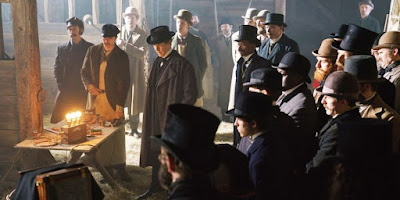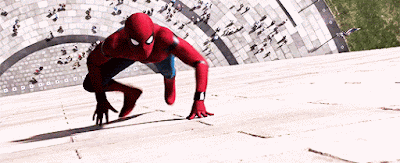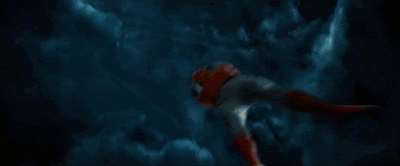Saturday is traditionally "Take Out the Trash" Day...
AC/DC
or
Bringing It All to Light
The Current War was produced in 2017 and finally released—to theaters—in late 2019 (after premiering with a different cut at the Toronto International Film Festival in September, 2017). The script had been acquired by The Weinstein Company (after appearing on the legendary store-house of interesting but unproduced screenplays "The Blacklist"), and filmed, executive produced by Martin Scorsese and Steve Zaillian.
Then, people finally paid attention to Harvey Weinstein's behavior, and the film, which had a lukewarm reception at the festival, was shelved and sold in the midst of TWC's implosion. Pulling strings with his final cut contract, director Alfonso Gomez-Rejon ordered re-shoots and did some trimming before the film was finally released to theaters in 2019.
In what might be called its thesis statement, the film begins with top-hatted businessmen walking in the dark through the woods to a clearing, at which point they are blinded by a circle of light that appears magically before them, composed of many singular light bulbs piercing the darkness. From the center of the array walks Thomas Edison (Benedict Cumberbatch) who greets them with "I hope you brought your check-books." He'll need it. For Edison's plan isn't merely the use of light-bulbs, but the invention of something that no one has heard of—the electrical grid. Edison's Big Idea is to create a network of generators—that he'll own—generating direct current to cities and neighborhoods. But, given DC's limited range he's going to have to make a lot of them.There's money to be made. And where there's money to be made, there is competition. George Westinghouse (Michael Shannon) wants to partner with Edison, but when his overtures are rebuffed, Westinghouse decides to find an alternate system. Alternating Current will travel over greater distances and given its on-again/off-again transmission could be safer and probably cheaper. The two go head-to-head trying to convince local governments to flip the switch, but they're reluctant with two systems in competition.With the arrival of Nikola Tesla (Nicholas Hoult) to his employ, Edison thinks he might have an inside track, but Tesla is a mercurial sort and soon bridles at Edison's single-mindedness and leaves, feeling his work is being ignored. He tries to develop his own system, but eventually joins forces with Westinghouse, who has taken his battle to the public. As every politician knows, the best way to persuade people is with fear. Westinghouse starts a smear campaign claiming that DC is dangerous and should not be allowed in homes. Edison starts to say the same thing about AC and, to prove his point, submits a proposal for a method of execution that is far more humane—the electric chair (despite professing that he would never be a part of weapon development or something destructive to mankind). When the first use of it sets the prisoner on fire, his reputation is damaged.
The movie sure looks interesting. The director—who's done a lot of second unit work on a lot of good movies—has a slightly cock-eyed way of framing that takes it out of the "vaunted past" look of period films and makes it a bit more surreal. But, despite a terrific cast and some sparks of nice writing, the film doesn't rise above being a more expensive version of one of those "The Inventions That Made America" episodes (but without the teasing before commercials and re-running of footage you've already seen afterwards). And with all its talk of greatness consisting of what you leave behind, there is more than a little pissing on a live-wire when it shows the blight of a skyline cross-hatched with electrical lines. But, then I don't think the Grid is what it's celebrating: the most moving sequence is when Edison shows off a new invention—a machine that shows hundreds of individual photographs of his late wife that appears to make her move and live again. You spend two hours talking electricity, but ultimately it's about the birth of motion pictures.






























































